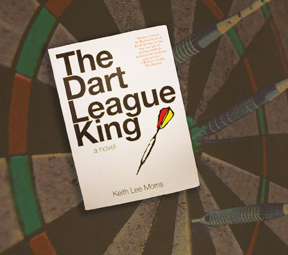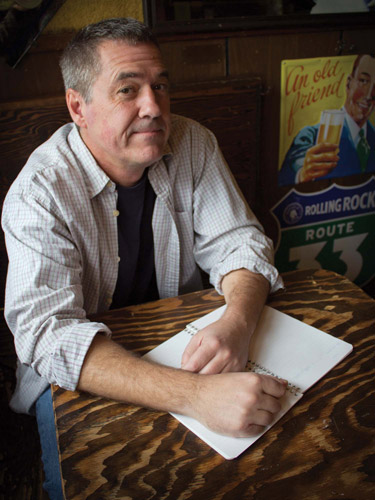Somebody had to go.
a conversation with Jeannie Davis
 Sure, it’s easier to do almost anything else (say, mow the lawn), but novelist Keith Lee Morris, author of The Dart League King, keeps flinging pointed prose.
Sure, it’s easier to do almost anything else (say, mow the lawn), but novelist Keith Lee Morris, author of The Dart League King, keeps flinging pointed prose.
Q You have said that in The Dart League King, your second novel, you started out to write a short story about the character Russell Harmon, but the other characters started crowding in, and the story became a novel. How do you turn those voices off when the novel is finished?
MORRIS: I was actually talking about that in class the other day. Someone asked, “Do you get attached to your characters?” which I guess is a different way of asking the same thing, and my response is: “Yes. Definitely.” Sometimes I forget that I’ve made these people up, and when I go back to my hometown, I’ll think I’m going to see them. They’re close enough to real life to seem real to me.
Q Many of your readers were pretty upset about what happens to Kelly at the end of The Dart League King.
MORRIS: Sorry about that. Somebody had to go. Couldn’t let everybody off the hook. If you’re trying to write a novel where you keep suggesting that something really bad is going to happen to one of these people, then you can’t walk away from it scot-free. It won’t feel like you’ve stayed true. Something had to give there, and that ended up being where it went.
Q I was going to ask you how you handle bad reviews but I couldn’t find one…
MORRIS: Right. Unless you’re a big shot, nobody’s going to say terrible things about you. There’s no point in picking on me; I’m not that well known. It’s hard to get books out there—literary books that have some kind of mainstream appeal. Three or four years ago, none of the books on the short list for the National Book Award had sold as many as 5,000 copies at the time they were nominated. Not one. So, we’re talking about the most critically acclaimed books of the year, and they had sold practically nothing. There are thousands of books out there; so if critics choose to review your book, often it’s because they liked it and they want to have a hand in promoting you and getting your name out there. If they don’t like a book, they just don’t bother to write about it. Unless you’re really well known. If you’re Toni Morrison, then everybody’s going to review your book, and some of the reviews will be critical. I should qualify that. There are publications like Publisher’s Weekly and Kirkus, that are going to give honest reviews even if the books are by authors who aren’t that well known. Those you sweat a little bit.
Q You’ve said that you like having written but you don’t much like writing and that it is hard work and makes you tired.
MORRIS: No I don’t like writing, and I’m really envious of writers who do like writing.
Q So why do you do it?
MORRIS: I feel like if I do it as well as I can, and I put it out there, then that’s important to me. Writing happens to be what I’m better at than other things. And I love reading. I love books. It made sense to me to want to put out something that somebody else could enjoy. But I never liked writing, even when I first started. I will do anything to keep from writing. I have found myself mowing the lawn to avoid writing.

Keith Lee Morris at Nick’s Tavern in downtown Clemson, the sort of place his characters might frequent: “If you’re a stranger in town, and you wander into a place like this, you can watch the people, but you won’t really know what’s happening between them.”
Q You have said that Faulkner is your favorite author. Are you reading much Faulkner these days?
MORRIS: No. I love As I Lay Dying, The Sound and the Fury, and Light in August. I don’t know if I can point to another author who’s written three books that mean as much to me as those three books. So really, when I say I love Faulkner, I’m really saying that I love Faulkner from about 1928 until about 1932. And I’ve read so much Faulkner, I don’t really go back to him much. I just reread War and Peace. I’m in the process of reading Marcel Proust again, Remembrance of Things Past, which I’ve never gotten all the way through.
Q What else are you reading?
MORRIS: I’m reading Richard Powers’ The Echo Maker. I want to read Colum McCann’s Let the Great World Spin; that’s next. Russell Banks has a new book out; I might check that out. I’m always looking for older stuff to read. I fell in love with George Eliot and her longest book, Middlemarch. My mother liked Mill on the Floss; so I want to read that.
Q You teach fiction here at Clemson. Do your students inspire you? Do your students make you crazy?
MORRIS: Yes. Both. I’ve had some great students over the years, some really inspiring students, some students I’m really proud to have taught, students who have gone on to do a lot of wonderful things. Sometimes it’s not the really good students who have the most effect, though, it’s the ones who struggle the most.
Q You started the Clemson Literary Festival five years ago in collaboration with another faculty member and a group of undergraduate students. Could you talk a little bit about what you had in mind when you started it, and where you’d like to see it five years from now?
MORRIS: I wanted the writers to come to Clemson and have a really good time. I wanted people to be able to go see the writers in places that would allow them to have a really good time and hang around afterward and talk to one another and talk to the writers. I wanted the students to be involved, to be able to run the festival—that was a big component of it. I wanted the writers to go home thinking, “Clemson might not have the most money, Clemson might not be the biggest book festival, but I sure had a lot of fun there.” And I think it’s worked. In Clemson, the Literary Festival can’t get huge. It can’t become like the Decatur Book Festival, near Atlanta, where the whole town just turns into a book festival for a few days. Their budget is hundreds of thousands of dollars every year, and they’ve got things going on in seven venues at the same time. But I’d like for our festival to grow, with more people coming in from out of town, drawing more artistic stuff here. Maybe an arty hotel downtown, so that writers and people coming to the festival could stay downtown.
Q Do you have lucky charms or talismans? Lucky socks? Do you have to write with a certain kind of pen?
MORRIS: I used to really like to write outside. I used to like to sit outside on a bench in the sun and write longhand. I will sometimes sit down at the computer, but I prefer to write longhand, and then edit onto the computer. I used to like to write in bars, and there are certain places here in town—Nick’s— that I would go. If two people are sitting and having a conversation ten feet away from me, I can’t write a word because I’m listening to their conversation. But if I’m sitting in a place where a hundred people are having conversations and music is playing really loud, I don’t hear any of it. But, I’m not superstitious in the least. Well, I do have the sneaking suspicion that sports teams I want to win are losing because I’m watching them. So sometimes I’ll leave the room if I think my team might get lucky. But that’s it.
Morris, professor of English, has mixed sports and writing since he covered basketball for his high school newspaper. His novel, The Dart League King, and his latest collection of stories, Call It What You Want, are available online and from publisher Tin House Books. The Dart League King was a Publisher’s Weekly starred review and Pick of the Week in 2008. In April 2012, the Clemson Literary Festival welcomed headliner Richard Ford, Pulitzer Prize-winning author of Independence Day.


